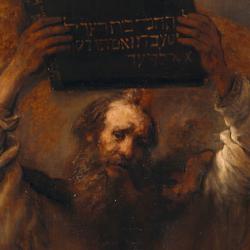Yahweh’s name resembles a human name. But there is a significant difference.
Yahweh identifies and names Himself. He didn’t leave Abraham to figure out His name; when Moses asked “What shall I say to Israel when they ask who sent me,” Yahweh answered by giving His name.
We don’t formulate our own names. We are given names. We have surnames that come from our parents, and their parents before them, and their parents on back to the first time someone received the name. Our first names are also given. We are told our names by our parents, and those names really become our names.
But it is not merely that we receive our names and identities from others in this obvious sense. We also receive a new identity from God, an identity that comes from outside of us, an identity that comes as a gift.
This is implied in the Third Word. We often translate the commandment as “Do not take the name of the Lord your God in vain,” and understand “take” as “speak.” Many Christians think that this is a prohibition of cussing, or taking oaths.
But the word isn’t “take” or “speak.” The verb nasa’ means “lift up” or “carry” or “bear.” It refers to burdens that we have to put on our shoulders, to things we pick up and lift. We do “lift the name of the Lord” when we speak His name, when we take an oath. But the wording is broader. We bear His name, carry it with us, all the time in everything we do.
Israel bears the name of Yahweh because He bore them. The same verb is used in Exodus 19:4, where Yahweh describes how He brought Israel from Egypt to Sinai on eagle’s wings. He carried them to the mountain, lifted and bore them up; and so they are to bear Him. Elsewhere in Exodus, the verb means “forgive” or “pardon.” When Moses asks Yahweh to forgive Israel for the incident of the calf, He asks Him to “lift” or “bear” Israel’s sins. Yahweh has carried away Israel’s sins, He has borne them, and for that reason they bear His name.
The Ten Words are all spoken in the grammatical first person. The Third Word doesn’t say, “You all, do not bear my name lightly.” It says, “You, you individual man or woman, do not bear My name lightly.” The reason for that, I think, is that Yahweh is addressing Israel as His redeemed son (Exodus 4:23). The Third Word emphasizes the family connection: As the son of Yahweh, Israel bears the name of Yahweh.
In the New Covenant, of course, we bear the name of God quite directly and explicitly. We are baptized into the name of the Father, Son, and Holy Spirit. That name is placed on us, and we are to carry it, lift it up, bear it well before the Lord. This is our identity. This is who we are. We are the people of the triune God.
Every Sunday, this name is re-placed on us, when the minister pronounces the benediction. According to Numbers 6, Aaron was to “set” the name of Yahweh on the people by pronouncing the Lord’s name over them three times. When the minister pronounces a triune blessing, we are renewed in our baptismal name, called and commissioned once again to “bear” the name well before the world.











